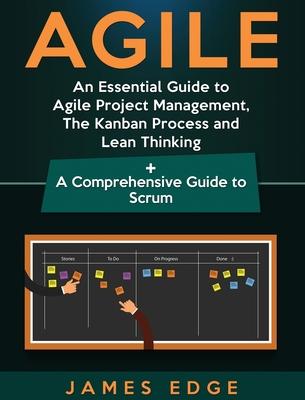If you want to produce faster while increasing the quality of your products, then keep reading...
2 comprehensive manuscripts in 1 book
- Agile: A Guide to Agile Project Management with Scrum, Kanban, and Lean, Including Tips for Sprint Planning and How to Create a Hybrid Waterfall Agile Software Development Methodology
- Scrum: How to Use the Agile Framework Called Scrum to Produce Faster While Increasing Quality
The word Agile gets thrown around a lot in software development circles but what exactly does it entail? You have probably seen whiteboards filled up with post-it notes somewhere, either in pictures or TV shows. Ever wonder what they are used for in a production setting?
This book will give you an overview of Agile methodologies and how you can use them to speed up development and drive customer satisfaction.
In part one of this book, you will...
- Get an overview of the 12 principles of Agile so you don't have to read the Agile Manifesto to understand the methodologies.
- Discover why you should adopt Agile.
- Learn how to set up Scrum boards, organize Scrum sprints, and see them to completion.
- Find out how to apply Toyota's Lean manufacturing techniques to a software development setting using Kanban.
- Learn about the Lean movement as it pertains to software and how to shave unnecessary costs from your software development projects.
- Discover how to implement Agile when your company is stuck using old methods.
- And much, much more!
Part two of this book include:
- A succinct review of Agile project management to set the foundation of your Scrum knowledge.
- The history and values of Scrum methodology.
- A description of each Scrum team member role and how to choose the best people for the job.
- The extensive reasoning for why you should choose Scrum as your go-to method for completing projects.
- Examples of Scrum artifacts accompanied with clear definitions of what they are and how they are used.
- The sprint process boiled down into an understandable cycle that can fit almost any project of any size.
- Comparison of the traditional method of project management, Waterfall, estimation and "story Points" used in Scrum projects.
- Equations used to determine release dates based on the features a client requests for a Scrum project.
- Various forms of a project roadmap and when and how to use them best.
- A comprehensive discussion on the daily Scrum, including tips on the best use of the time in the stand-up.
- Two case studies presented along with the lessons learned from the practical application of Scrum in different industries.
- Additional tips and tricks on how to become the best Scrum company around.
- And much, much more!
Get this book now to learn more about Agile and Scrum!
